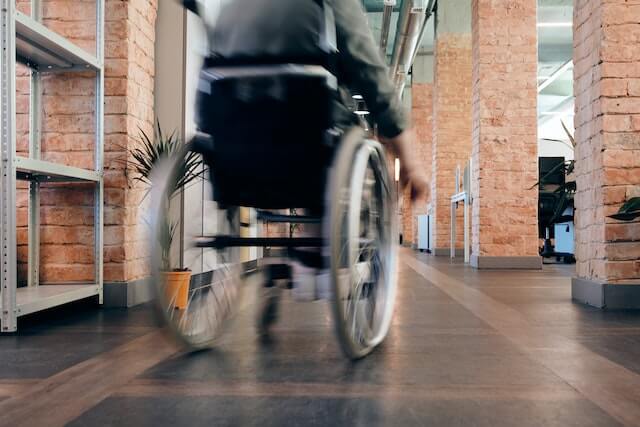It is important to understand your responsibilities as a landlord when it comes to renting to tenants with disabilities. Discrimination against people with disabilities in the housing market is illegal under the Fair Housing Act. This law prohibits housing providers from denying housing, setting different terms or conditions, or advertising in a discriminatory manner based on disability status.
Because they might need to make adjustments, the idea of renting to tenants with disabilities may sometimes be overwhelming. However, that should never be a reason to deny them housing. There are also key advantages to renting to disabled tenants. For instance, they are more likely to stay longer. Having said that, don’t rule out renting to this demographic!
This article will explore the inquiries landlords are allowed to make and structural modifications to accommodate tenants with disabilities.
What does “disability” mean?
A person with a disability is someone who has a physical or mental impairment that substantially limits one or more major life activities. It includes individuals who have a record of such an impairment or are regarded as having such an impairment. Major life activities include activities such as walking, seeing, hearing, and performing manual tasks.
Mental disabilities include post-traumatic stress disorder (PTSD) and depression. Physical disabilities, on the other hand, include mobility impairments. Examples include individuals who use a wheelchair, have vision impairment, or have HIV/AIDS.

Are landlords and rental agents allowed to inquire about a tenant’s disability?
During the application process, landlords and rental agents are not allowed to ask about a tenant’s disability status. One should not be treat them any differently from other tenants. Asking for proof of disability, medical records, or the reason for their condition is prohibited. Basically, the inquiries you make of tenants with disabilities must be the same inquiries you make of all other tenants.
However, landlords can ask the tenant if they require any accommodations or modifications to the rental unit due to a disability. Once they sign a lease and request changes to the property so that it’s more functional for them, then asking for proof of their disability would be reasonable.
Do landlords have to adapt to a tenant’s needs?
Accommodating disabled tenants is not only the right thing to do but it’s also the law. As a landlord, it’s important to provide reasonable accommodations for disabled tenants to improve their quality of life. Reasonable accommodations may include modifying policies, practices, and rules. For example, you can allow a service animal even if you have banned pets on the property.
Tenants with disabilities may also request that the landlord makes reasonable modifications to their unit or common areas. For example, installing wheelchair access or lowering kitchen counters. However, if the request is unreasonable or would be a financial burden, landlords can negotiate with their tenants for an alternative agreement. Additionally, if the requested modification would make the unit unsuitable for future non-disabled tenants, landlords can ask the tenant to bring the property back to its original condition upon moving out. Include a clause in the rental contract that outlines the reasonable accommodation policy. This could avoid disputes in the future.
Making reasonable accommodations for disabled tenants is not only beneficial to the tenant. It also helps landlords by reducing turnover and vacancy rates. It’s important to communicate with disabled tenants to better understand their needs and come up with mutually beneficial solutions.
Examples of modifications to your rental property
Railings
Adding railings to stairways and walkways can help tenants with mobility impairments. In the restroom, where the possibility of mishaps like slip-and-falls is substantially higher, grab bars are a need.

Wheelchair ramps and chair lifts
Installing a wheelchair ramp or chair lift can make entryways and common areas accessible to tenants with mobility impairments. You must put in a ramp at the front door and inside the building to accommodate renters who use wheelchairs. This is especially vital if your rooms include steps.
Roll-in shower
Make the bathroom accessible to tenants who use a wheelchair or have mobility impairments. You can do this by replacing a traditional shower with a roll-in shower.
Widened doorways
Widening doorways can make it easier for tenants who have mobility impairments to move throughout the rental unit. Wheelchair accessibility requires indoor doors to be at least 32 inches wide. Exterior doors, on the other hand, must be at least 34 inches wide.
Parking
Designating accessible parking spaces close to the rental unit can make it easier for tenants with mobility impairments. If they’re closer to the entrance, it would be less burdensome for them. It’s also convenient if they have emergencies or if they need urgent transportation.
Braille
Installing Braille signs in common areas such as elevators and stairwells can make the property accessible to tenants with vision impairments. This is also helpful in operating HVAC controls, washing machines, and light switches. Additionally, preparing rental documents in Braille form would also be helpful to visually impaired tenants.

Who pays for modifications?
Landlords are responsible for paying for reasonable modifications that are necessary to allow a tenant with a disability to have equal access to the rental property. However, tenants are responsible for paying for modifications that are not necessary. These are modifications that are solely for their convenience. You won’t get in trouble for refusing to grant excessive requests, such as building an elevator. The keyword is “reasonable.”
Other ways to ensure disabled tenants are comfortable
Aside from property modifications, landlords can apply more ways to provide a comfortable living environment to tenants with disabilities. Conduct regular property inspections to identify any potential hazards or barriers that may prevent disabled tenants from accessing their units or common areas.
Train property staff to recognize and provide reasonable accommodations for disabled tenants. This includes customer service training. Ensure that all staff members treat disabled tenants with respect and dignity. Additionally, review and update policies and practices to ensure they are compliant with the law and accommodating to disabled tenants.
Can landlords refuse tenants with disabilities?
Someone with a disability cannot be refused rental by landlords. As mentioned earlier, refusing to rent to someone based on their disability status is illegal under the Fair Housing Act.
As a landlord or rental agent, it is important to understand your responsibilities when renting to tenants with disabilities. Discrimination against people with disabilities is illegal. Landlords are required to make reasonable accommodations to rental properties. This allows tenants with disabilities to have equal access and use of the property. By making reasonable accommodations, landlords can provide safe and comfortable housing to tenants with disabilities while complying with fair housing laws.
A rental property that can comfortably accommodate individuals can also attract more tenants. There are a lot of people who struggle to find homes that are safe for them or their disabled loved ones. Additionally, society gives great importance to inclusivity and fairness. Tenants prefer landlords who are considerate of the needs of others.
Highlight the disability-friendly features of your rental home when publishing a listing on Padleads. Once you syndicate your listing to other high-traffic sites, more potential tenants can see it and appreciate your thoughtful initiatives.